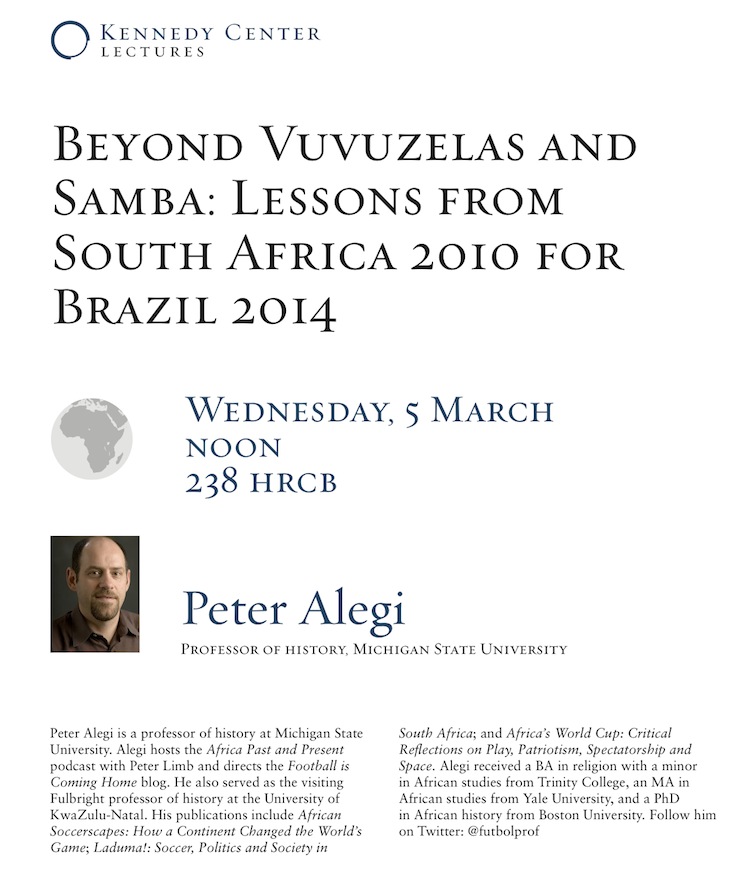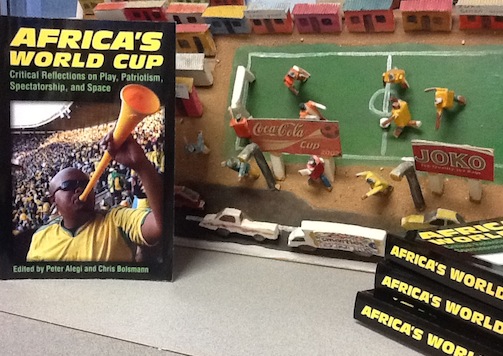 Alexandra Wrage, a Canadian attorney and founder of TRACE International, a business anti-corruption group, was interviewed by BBC Newsnight about the ongoing FIFA corruption scandal over Qatar’s successful bid to host the 2022 World Cup.
Alexandra Wrage, a Canadian attorney and founder of TRACE International, a business anti-corruption group, was interviewed by BBC Newsnight about the ongoing FIFA corruption scandal over Qatar’s successful bid to host the 2022 World Cup.
Wrage worked for FIFA’s governance reform commission from 2011 to 2013. In April 2013 she told the Wall Street Journal “that the FIFA executive committee ‘undermined the recommendations we were making’at almost every turn.” She resigned because “you don’t keep doing the same thing if you’re not having an impact.”
Wrage believes change is more likely to come if Swiss law regulates locally based non-profits like FIFA (sic!) more effectively and, perhaps, if a groundswell of popular criticism can compel corporate sponsors to take action.
Click here to watch the 4-minute interview.
Tag: FIFA
I was recently interviewed by BBC Brasil‘s João Fellet and asked to compare the hosting of the 2010 World Cup in South Africa with the preparations for the 2014 World Cup in Brazil. Below is the Portuguese text of what transpired [translate] and a link to read the full article.
15 May 2014
BBC Brasil – Quatro anos depois da Copa de 2010, o que ficou do torneio para os sul-africanos?
Peter Alegi – Há um tipo de nostalgia por aquele período, por aquela sensação de unidade, solidariedade, de estar no centro do mundo. Os estrangeiros que foram para a Copa perceberam que os estereótipos negativos sobre a África do Sul não eram verdadeiros, e isso ainda faz o país se sentir bem. As emoções de um carnaval como a Copa são difíceis de bater.
BBC Brasil – Houve outros legados?
Alegi – O legado emocional foi importante de diferentes maneiras. Ele fez as pessoas sentirem um senso de unidade num país ainda muito dividido quanto a raças, classes e gêneros. Nos estádios sul-africanos, as pessoas cantam o hino abraçadas ou de mãos dadas, como nas igrejas. Num país onde o povo não tem muitas oportunidades de estar junto, a mágica do nacionalismo explodiu de uma maneira positiva.
Isso aconteceu só 16 anos após o apartheid. Sediar um evento bem sucedido fez com que os sul-africanos se sentissem muito orgulhosos.
O torneio também despertou sentimentos de panafricanismo. Por um ou dois meses, os sul-africanos se sentiram parte do continente africano. Isso foi encorajador, levando em conta os problemas do país com a xenofobia.

To read full article click here.
Beyond Vuvuzelas and Samba
 Listen to “Beyond Vuvuzelas and Samba: Lessons from South Africa 2010 for Brazil 2014,” a lecture I delivered at Brigham Young University’s David M. Kennedy Center for International Studies on March 5, 2014.
Listen to “Beyond Vuvuzelas and Samba: Lessons from South Africa 2010 for Brazil 2014,” a lecture I delivered at Brigham Young University’s David M. Kennedy Center for International Studies on March 5, 2014.
The talk analyzes the political, economic, and cultural dynamics of the 2010 FIFA World Cup in South Africa and its similarities to the upcoming 2014 FIFA World Cup in Brazil.
Click here to watch the video.
The latest Cowries and Rice podcast features Michigan State University History PhD candidate Hikabwa Decius Chipande discussing China’s stadium diplomacy in Zambia. Intriguingly, the enterprising hosts of the podcast, Winslow Robertson and Dr. Nkemjika Kalu, contacted Chipande in Lusaka after reading his “China’s Stadium Diplomacy: A Zambian Perspective” post on this blog.
In the interview (listen above), Chipande expands on his original contribution to explore several key aspects of the national and international politics of stadium construction in contemporary Zambia. Chipande shares his expert view on Zambian responses to the new arenas, inspired by Elliot Ross’s recent essay on the topic for Roads & Kingdoms, and contextualizes them within larger Chinese investments in mining and other sectors of the economy in south-central Africa.
Chipande is a recipient of the FIFA Havelange Research Scholarship for his doctoral dissertation on the social and political history of football in Zambia, 1950-1993. Reach out to him on Twitter at @HikabwaChipande.
Futebol Nation: The Story of Brazil
The Garrincha of futbology, David Goldblatt, admits he’s neither Brazilian nor a Brazilianist as he begins his recent public lecture at Pitzer College in California.
Then, like Garrincha, he feigns left, goes right through through Brazil’s World Cup history, pivots on slavery, Lusotropicalism and GINI coefficients, does a give-and-go with Mario Filho, dribbles around Benedict Anderson, reaches the Maracanazo touchline, and delivers a cross into the Vinegar Revolt of 2013.
Eduardo Galeano has written that “in the history of soccer no one made more people happy” than Garrincha. It’s not too much of a stretch to say that in the field of futbology the same is true for David Goldblatt.

The Football Scholars Forum, an online fútbol think tank I co-founded at Michigan State University, recently launched its 2013-14 season. On October 24, FSF held a lively discussion of Africa’s World Cup: Critical Reflections on Play, Patriotism, Spectatorship, and Space, a newly published collection I edited with Dr. Chris Bolsmann, a South African sociologist based in the UK.
The 90-minute event opened with a consideration of the book’s attempt at blending scholarly and journalistic approaches to exploring the game and its broader implications. The editors and several chapter authors in attendance talked about the process of writing and editing, as well as their experience working with an academic press on a topic with potentially broad appeal.
The book, much of it written in the first person as a loving critique of the 2010 tournament, demonstrates how the FIFA World Cup story is entangled in a web of national and international politics, sporting culture, and global capitalism. Many interventions linked South Africa 2010 to Brazil 2014, particularly through the public financing of expensive and unsustainable new World Cup stadiums in countries with dysfunctional schools and hospitals and high rates of poverty and inequality. The online conversation also featured Luis Suarez’s handball against Ghana and the contradictory legacies of this “African” World Cup.
Participants logged in from half a dozen countries in North America, South America, Africa, and Europe. In attendance: Andrew Guest, Chris Bolsmann
, Christoph Wagner
, David Patrick Lane,
David Roberts,
Derek Catsam,
Jacqueline Mubanga,
Raj Raman,
Orli Bass
, Rwany Sibaja,
Laurent Dubois
, Achille Mbembe
, Jordan Pearson, Sean Jacobs, and Alex Galarza (all via Skype); and Liz Timbs,
Dave Glovsky,
Alejandro Gonzalez, and
Peter Alegi (in East Lansing).
For a Storify Twitter timeline of the event click here.
The audio recording of the discussion is freely available here.
The next Football Scholars Forum event on November 14 will focus on Soccer in the Middle East, a special issue of the journal Soccer and Society (2012), edited by Alon Raab and Issam Khalidi.
Police in riot gear battle protestors in the streets of Rio de Janeiro. Aggressive slum clearance threatens favelas. Gentrification at Maracanã Stadium. FIFA exclusion zones around World Cup venues. Sound familiar?
As readers of this blog know, South Africa staged a successful World Cup in 2010, marketing the country globally to tourists and foreign investors, and uniting, albeit temporarily, a nation divided along racial and economic fault lines. South Africa’s experience was part of a larger trend, that of BRICS countries enthusiastically embracing the global mega sporting events business: from Beijing (2008 Summer Olympics) and Delhi (2010 Commonwealth Games) to Brazil (2014 World Cup and 2016 Olympics) and Russia (2014 Winter Games [Sochi] and 2018 World Cup).
Recent media coverage of Brazil’s preparations reveals growing FIFA unease with delays in infrastructure construction projects and other hosting problems. Speaking at a FIFA academic symposium last week, FIFA General Secretary Jerome Valcke expressed frustration with Brazil’s government, saying that “less democracy is sometimes better for organizing a World Cup,” according to a Reuters wire story. Valcke’s extraordinary remark confirmed some experts’ suspicions about FIFA’s underlying rationale for choosing autocratic Russia and Qatar (2022) as World Cup hosts.
Another story about 2014 World Cup stadiums was published in the New York Times Goal blog. James Young’s “White Elephant Hunting in Brazil” highlighted the importance of staging matches across the country. It concluded that while there were some troubling questions about the preparations, “Nevertheless, amid talk of delays and spiraling costs, the 2014 World Cup will at least be an event for all Brazil. In a country where the north-south cultural and economic divide is so deeply engrained, that at least is something to celebrate.”
Young’s article elicited a sharp response from Chris Gaffney (@geostadia), Visiting Professor at the Graduate School of Architecture and Urbanism at Rio’s Federal University, on his blog “Hunting White Elephants.”
“The projects associated with the World Cup were poorly planned, hastily executed (if at all) and may not serve the long-term needs of the cities or the country,” Gaffney writes. “There is no redress (as the [NYT] author suggests) of historically-situated cultural or economic divides in World Cup investment, especially when we take into consideration the astronomical sums being invested in Rio de Janeiro for the 2016 Olympics.” Gaffney concludes emphatically by pointing out that Young’s piece “does not attempt to kill White Elephants, but to make them into bichos de estimação (pets).”
On Saturday, April 27, ABC radio in Australia picked up on Gaffney’s critical blogging. Listen to Geraldine Doogue’s interview with him here.